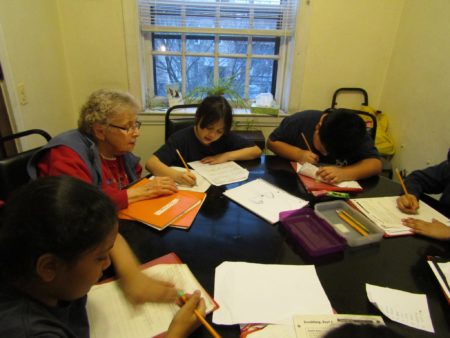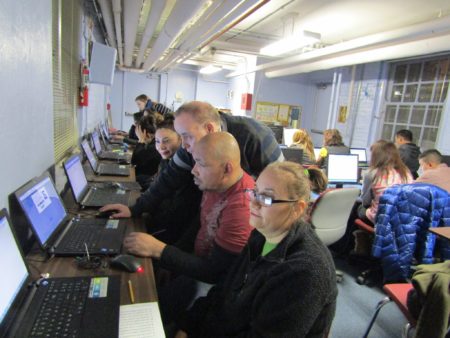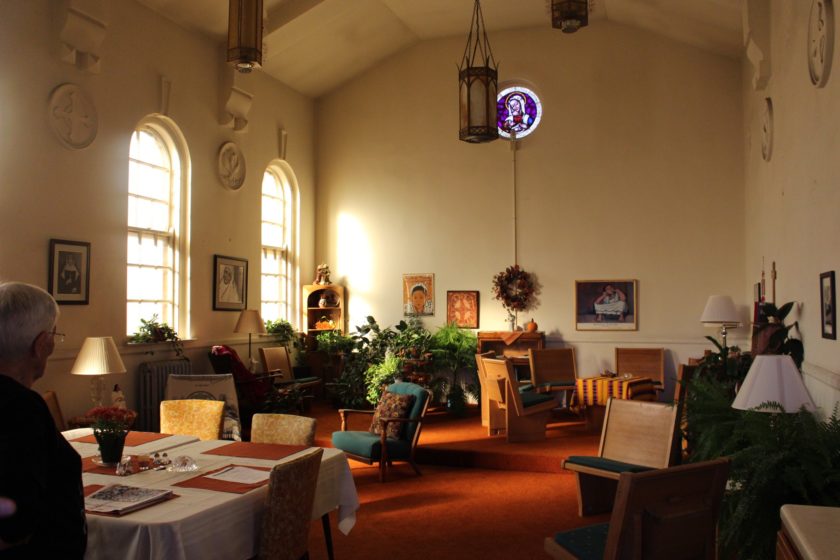They came to Humboldt Park at a time when it was teeming with nuns and screaming with need. They moved into the convent 40 years ago and set to work creating a welcoming center for the community, first at the neighboring school and later within their own home.
Gang violence, prostitution, robberies – these sisters have seen it all. They’ve watched the neighborhood flip from European migrants to Latinos, have watched the commerce and needs change with it, and have remained a constant force in the community.
In a 90-year-old convent on Chicago’s West Side, four Sisters of Providence live, pray and work. Kathleen Desautels, Patricia Fillenwarth, Dorothy Gartland and Pamela Pauloski are the remaining nuns at what once was a 20-sister convent in West Humboldt Park. They work in and out of the neighborhood to promote peace among the struggling members of Chicago’s communities.
With a history of Sisters of Providence in Humboldt Park since 1908, the neighborhood community has formed a strong bond with the sisters.
Dorothy Gartland, 87, said that the convent is one of the few residences in the area without a front gate. In the summer, neighborhood children hangout on their front porch.
Although not quite the same amount of “crime and these shootings like there is now on the south side,” Patricia Fillenwarth, 76, remembers the ‘80s as the period when crime and violence ravaged Humboldt Park. Although the sisters did not experience gang violence on their block, there were incidents on others.
As robberies heavily increased that decade, Fillenwarth noted that residents stopped wearing their gold chains out in public.
“They would never wear them out – they would always tuck them inside or not put them on when they’re outside at all because there was a lot of stealing of that, purses, stuff like that,” Fillenwarth said.
Since then, neighborhood groups such as the Block Club have helped curb crime and increase police presence. As a result, violence in Humboldt Park has significantly decreased.
“Our neighborhood has improved over the years in that we don’t nearly have the gang violence that we did have before,” Fillenwarth said.
Fillenwarth attributes this to gentrification as more invested and stable families move into the neighborhood. Still, many of these families are undocumented and make less than $15,000-$20,000 a year, continuing the need of the Sisters of Providence in the area.
Using her keen eye for community need and her blunt depictions of how to address it, Fillenwarth runs Providence Family Services, the family counseling center she founded in 1994.
Located in the converted front section of the convent, Providence Family Services provides pay-what-you-can services, including ESL classes, an after school homework club, family and couples counseling, and computer classes when there is an affordable teacher available.
As principal for the neighboring Maternity of Blessed Virgin Mary school during the 1980s, Fillenwarth often found herself recommending counseling to parents of her students.
“I became aware of the fact that a lot of problems existing in the family stem from the fact that there was poor communication and a lack of parenting skills,” Fillenwarth said.
A lack of affordable Spanish counseling led Fillenwarth to leave her position as principal in 1991 and return to school for a degree and license in counseling.
By providing bilingual counseling services, parents with poor English can create stronger home environments in their native language.
Kathleen Desautels, 78, another Sister of Providence, does her work outside of Humboldt Park, but aims to combat many of the societal problems that directly affect members of her neighborhood.
Desautels works as the Justice Promoter for the Eighth Day Center for Justice in Chicago’s West Loop.
Eighth Day provides financial support and strategic advice to national and local organizations and committees looking to take a stand against social, political and economic injustice. They also send Eighth Day members to appear with coalitions at rallies and meetings.
The center was founded by six Catholic congregations, including the Sisters of Providence. The organization has expanded to include employees and volunteers from all over the Chicago community.
“Our analysis is such that it gets at the root. We don’t do direct service, so we look at what are the core issues within our society that are at the root of war, or the environmental issue of climate change, or women’s issues in the church and the like. We do a lot of education processes,” Desautels said.
Dorothy Gartland, 87, Sister of Providence, was the original Justice Promoter at 8th Day. She has also taught at St. Mel’s grade school and done philanthropy work for communities in Guatemala and Nicaragua.
“Sort of retired,” Gartland’s work now stays primarily within the convent and Humboldt Park community, either among the plants and family photos that clutter her home office or among the homework club and ESL students at the counseling center.
Gartland recalled how leading up to Fillenwarth starting the Providence Family Center, they received a call from a distressed mother in need of guidance. It was a first communion day at the church, and Gartland and Fillenwarth left to visit this woman.
They found the mother and her six children living among the cement walls of an unfinished basement.
“The cement walls, cement floor, and here are all these beautiful kids and Dorothy was playing with them. I went over to the drugstore to put some calamine lotion on their faces, they were scratching scratching, scratching with the chicken pox,” Fillenwarth recalled.
While Gartland entertained the children, Fillenwarth consulted with the mother who had been beaten and raped by her husband and was now pregnant with a seventh child she could not support.
Fillenwarth said she saw the woman in passing on the street later, still pregnant. She had decided to keep the baby, but because she reached out to the sisters, she had help finding a more suitable living situation at a local shelter.
“She felt like as a woman and as a person she had the right to make that choice. So I was glad to be there to help her through that,” Fillenwarth said.
Stories like these are why Fillenwarth and the sisters of providence feel accessible counseling is needed in their neighborhood. No matter where their work takes them, Fillenwarth recognizes that their continued presence and care for Humboldt Park means the most to the people of their community.
The nuns attribute the success of their work in the Humboldt Park and greater Chicago communities to their faith.
Desautels said that her devotion and identity as a nun give her perspective that she otherwise would not have had when working with these diverse populations.
“I would never know what it’s like to be a person of color and to be on the fringe of the economic/political system, but I do have a little taste of what it’s like to be on the fringe of the Catholic Church,” Desautels said.
As the neighborhood gentrifies, the Sisters of Providence said that they will probably end their more than century-long residency at the convent in Humboldt Park.
They hope that the next generation of Sisters and community activists will choose to place themselves on these fringes of society.
“Sisters should always go where the need is,” Fillenwarth said.
Recently, Eighth Day sent members to be apart of a large coalition that included Black Lives Matter to city hall to request the citizen right to oversee police appointees.
Eighth Day is currently supporting 20 active groups. Two of these groups, Chicago Justice Torture Memorial and the People’s Law Office, work to bring innocent victims of police torture home from prison.
Desautels is also a committee member for a poverty and justice fund.
It is this combination of work on a neighborhood level and work on an institutional level that lead to the march of what Desautels calls the “two feet of justice.”
Relying on her “good education on the social teachings of the church,” Desautels looks at the life of Jesus and understands how “he was acting in support of and hanging around with people who were on the fringe of society – and that’s what we’re called to do,” Desautels said.
“I would never know what it’s like to be a person of color and to be on the fringe of the economic/political system, but I do have a little taste of what it’s like to be on the fringe of the Catholic Church,” Desautels said.
Fillenwarth also notes the church as a “strong anchor” to the largely Catholic community of Humboldt Park.
“Many times the church brings people together and keeps them together,” Fillenwarth said.
As the neighborhood gentrifies, the Sisters of Providence said that they will probably end their more than century-long residency at the convent in Humboldt Park.
Fillenwarth finds the afterschool homework club effective because it gives students a place to receive academic help they don’t often find at home. When students return home, their schoolwork is finished, and they can spend time with their families.
Kathleen Desautels, 78, another Sister of Providence, does her work outside of Humboldt Park, but aims to combat many of the societal problems that directly affect members of her neighborhood.
It is this combination of work on a neighborhood level and work on an institutional level that lead to the march of what Desautels calls the “two feet of justice.”
Dorothy Gartland, 87, Sister of Providence, was the original Justice Promoter at 8th Day
“We’ve got a lot of stories like that where you feel you’ve got your finger in it just a tad to help people. Sometimes you don’t see any progress day by day, but then you step back and look at it and you see that it’s good work,” Fillenwarth said.
The nuns attribute the success of their work in the Humboldt Park and greater Chicago.
The organization has expanded to include employees and volunteers from all over the Chicago community, but since the organization’s conception in 1974, a Sister of Providence has always served as the Justice Promoter.






